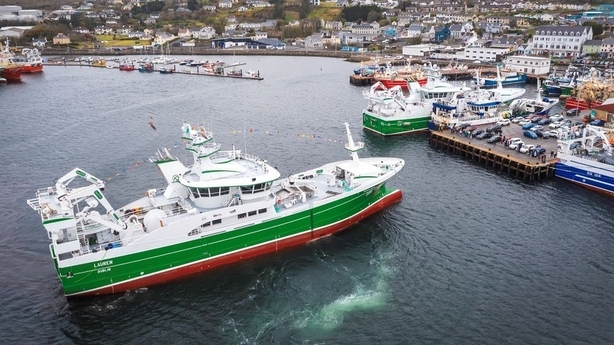More than 1,000 tonnes of high-quality blue whiting were rendered unfit for human consumption in Killybegs, Co Donegal last weekend because of the weighing system used by the Sea Fisheries Protection Authority (SFPA), according to the Irish Fish Processers and Exporters Association (IFPEA).
The IFPEA said the 'MFV Lauren' returned after her maiden voyage to her home port of Killybegs and was subjected to a "full monitor" or control weighing by the SFPA.
Brendan Byrne, CEO of the IFPEA, said this rendered the fish unsuitable for food products and left over 50 seasonal workers without work in a local processing plant.
Mr Byrne said: "The SFPA unilaterally introduced a controversial change to fish weighing procedures on March 7th. Before then you could utilise an SFPA approved pier-side weighing system".
However, he said, the new regime forces the draining of refrigerated sea water from the fish storage tanks, and this dewatering breaks the cold chain and results in the fish being compressed during transport and made unfit for human consumption.

The ongoing row over the weighing regime has seen a number of vessels leave Killybegs with their catch rather than comply with the weighing system, which skippers and processors say would damage their catch.
In one case, a Norwegian vessel landed its catch of blue whiting in Derry instead of Killybegs and the fish was transported by road from there to the processing plant in Killybegs.
Mr Byrne said: "No other EU country is being forced to adopt such an unworkable regime, so Ireland’s fishing industry is now being put at a huge competitive disadvantage. The Irish Sea Fishery Protection Authority are imposing the new weighing system, despite a High Court ruling that authorities should introduce an alternative system. We call on the Government to halt the new regime immediately and implement the High Court ruling."
The SFPA said that only 5%, or an estimated 30 landings of pelagic fish annually, are subjected to a full inspection, which includes supervising the weighing before transport of the catch.
It said: "The interim fisheries Control Plan seeks to ensure control systems are adequate to address significant concerns expressed by the EU Commission regarding inaccurate weighing of catches, particularly by operators landing bulk pelagic catches to Ireland, which resulted in the EU Commission’s revoking of Ireland’s weighing-after-transport Control Plan in April 2021.
"To meet the requirements of the Interim Control Plan, operators may select one of two options for conducting this weighing before transport: Water in Tare Weight and Water in Nett Weight. To preserve the quality of the catch, fish are in water when weighed in both options.
"For absolute clarity there is no requirement in either instance for the fish to be weighed dry. Vessel masters and operators in Killybegs can avail of an industry-owned pierside device to separate water from fish as it exits the vessel before discharging directly into a tanker pre-filled with water which is then weighed on the weighbridge (Water in Tare Weight).
"Alternatively, the fish can be weighed on the weighbridge without using the industry-owned pierside device (Water in Nett Weight)."
Representatives of the industry dispute the SFPA's position and say the outcome of the weighing regime renders the fish unsuitable for food products.
CEO of the Irish Fish Producers Organisation Aodh O'Donnell said the weighing debacle must be addressed urgently "or displacement of supply could result in the loss of up to €40 million annually".
He said that the current scheme "presents a severe challenge for Irish ports, striving to attract landings for Irish seafood processors. Already vessels have clearly stated that they are not prepared to land their fish in Killybegs, due to the unreasonable and unworkable weighing obligations imposed upon them."
The controversy is damaging to the reputation of quality Irish seafood and is losing business for our seafood exporters, he said.
"There are also wider socio-economic losses for the region, such as loss of earnings for part-time fish processing workers who missed badly needed employment opportunities.
"The processing plants are a significant source of employment. They are the backbone of the economy for our coastal communities, who are frustrated and angry at how matters have unfolded since March. To secure supply and to compete internationally, we just need a common-sense approach and a level playing field in applying EU regulations," said Mr O'Donnell.







